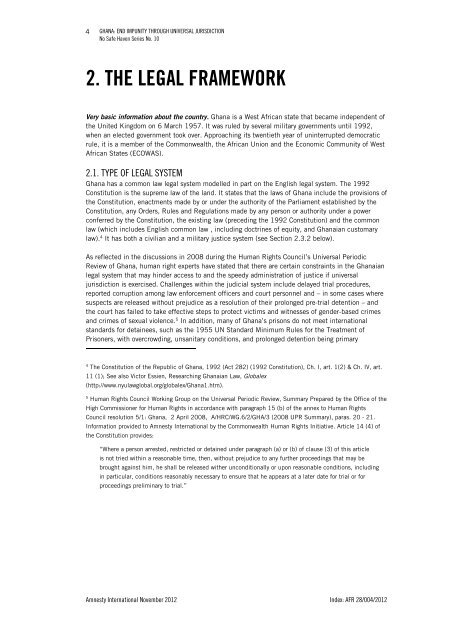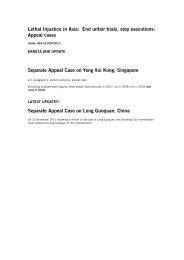Ghana - Amnesty International
Ghana - Amnesty International
Ghana - Amnesty International
Create successful ePaper yourself
Turn your PDF publications into a flip-book with our unique Google optimized e-Paper software.
4GHANA: END IMPUNITY THROUGH UNIVERSAL JURISDICTIONNo Safe Haven Series No. 102. THE LEGAL FRAMEWORKVery basic information about the country. <strong>Ghana</strong> is a West African state that became independent ofthe United Kingdom on 6 March 1957. It was ruled by several military governments until 1992,when an elected government took over. Approaching its twentieth year of uninterrupted democraticrule, it is a member of the Commonwealth, the African Union and the Economic Community of WestAfrican States (ECOWAS).2.1. TYPE OF LEGAL SYSTEM<strong>Ghana</strong> has a common law legal system modelled in part on the English legal system. The 1992Constitution is the supreme law of the land. It states that the laws of <strong>Ghana</strong> include the provisions ofthe Constitution, enactments made by or under the authority of the Parliament established by theConstitution, any Orders, Rules and Regulations made by any person or authority under a powerconferred by the Constitution, the existing law (preceding the 1992 Constitution) and the commonlaw (which includes English common law , including doctrines of equity, and <strong>Ghana</strong>ian customarylaw). 4 It has both a civilian and a military justice system (see Section 2.3.2 below).As reflected in the discussions in 2008 during the Human Rights Council’s Universal PeriodicReview of <strong>Ghana</strong>, human right experts have stated that there are certain constraints in the <strong>Ghana</strong>ianlegal system that may hinder access to and the speedy administration of justice if universaljurisdiction is exercised. Challenges within the judicial system include delayed trial procedures,reported corruption among law enforcement officers and court personnel and – in some cases wheresuspects are released without prejudice as a resolution of their prolonged pre-trial detention – andthe court has failed to take effective steps to protect victims and witnesses of gender-based crimesand crimes of sexual violence. 5 In addition, many of <strong>Ghana</strong>’s prisons do not meet internationalstandards for detainees, such as the 1955 UN Standard Minimum Rules for the Treatment ofPrisoners, with overcrowding, unsanitary conditions, and prolonged detention being primary4The Constitution of the Republic of <strong>Ghana</strong>, 1992 (Act 282) (1992 Constitution), Ch. I, art. 1(2) & Ch. IV, art.11 (1); See also Victor Essien, Researching <strong>Ghana</strong>ian Law, Globalex(http://www.nyulawglobal.org/globalex/<strong>Ghana</strong>1.htm).5Human Rights Council Working Group on the Universal Periodic Review, Summary Prepared by the Office of theHigh Commissioner for Human Rights in accordance with paragraph 15 (b) of the annex to Human RightsCouncil resolution 5/1: <strong>Ghana</strong>, 2 April 2008, A/HRC/WG.6/2/GHA/3 (2008 UPR Summary), paras. 20 - 21.Information provided to <strong>Amnesty</strong> <strong>International</strong> by the Commonwealth Human Rights Initiative. Article 14 (4) ofthe Constitution provides:“Where a person arrested, restricted or detained under paragraph (a) or (b) of clause (3) of this articleis not tried within a reasonable time, then, without prejudice to any further proceedings that may bebrought against him, he shall be released wither unconditionally or upon reasonable conditions, includingin particular, conditions reasonably necessary to ensure that he appears at a later date for trial or forproceedings preliminary to trial.”<strong>Amnesty</strong> <strong>International</strong> November 2012 Index: AFR 28/004/2012
















